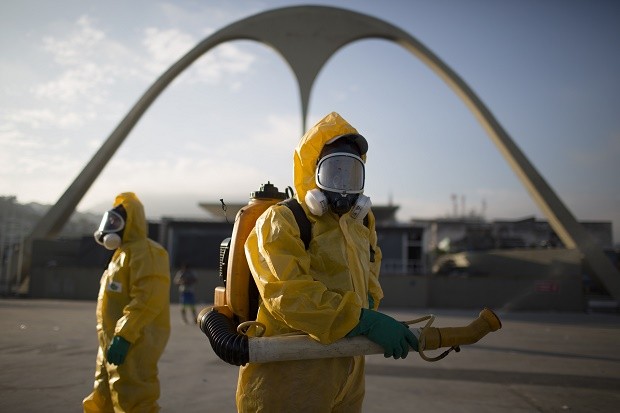WHO mulls global health emergency declaration on Zika

A health worker stands in the Sambadrome as he sprays insecticide to combat the Aedes aegypti mosquitoes that transmits the Zika virus in Rio de Janeiro, Brazil, Tuesday, Jan. 26, 2016. Inspectors begin to spray insecticide around Sambadrome, the outdoor grounds where thousands of dancers and musicians will parade during the city’s Feb. 5-10 Carnival celebrations. Brazil’s health minister says the country will mobilize some 220,000 troops to battle the mosquito blamed for spreading a virus linked to birth defects. AP
GENEVA, Switzerland — The World Health Organization’s emergency committee will on Monday debate whether a Zika virus outbreak suspected of causing a surge in serious birth defects in South America should be considered a global health emergency.
The UN health agency warned last week that the mosquito-borne virus was “spreading explosively” in the Americas, with the region expected to see up to four million cases this year.
READ: Colombia reports more than 2,000 Zika cases in pregnant women | In the know: Zika virus
The WHO is under pressure to act quickly in the fight against Zika, after admitting it was slow to respond to the recent Ebola outbreak that ravaged parts of west Africa.
Although the mosquito-borne virus’s symptoms are relatively mild, it is believed to be linked to a surge in cases of microcephaly, a devastating condition in which a baby is born with an abnormally small head and brain.
Article continues after this advertisementWhile it has yet to be definitely proven that the microcephaly cases are caused in some way by the Zika virus, WHO chief Margaret Chan warned last week the causal relationship was “strongly suspected”.
Article continues after this advertisementREAD: UN: Zika virus link to babies’ small heads ‘extremely worrisome’
Zika is also suspected of links to a neurological disorder called Guillain-Barre syndrome.
Brazil, the hardest hit country, sounded the alarm in October, when a rash of microcephaly cases emerged in the northeast.
Since then, there have been 270 confirmed cases of microcephaly and 3,448 suspected cases, up from 147 in 2014.
Amid alarm over the surge in microcephaly cases, Colombia, Ecuador, El Salvador, Jamaica and Puerto Rico have even warned women to delay conceiving until the Zika outbreak is brought under control.
Jitters over Zika have spread far beyond the affected areas to Europe and North America, where dozens of cases have been identified among people returning from vacation or business abroad.
Resolute action
In a bid to clarify what the response to the outbreak should be, WHO chief Margaret Chan called for Monday’s closed-door meeting of the organization’s emergency committee to determine if Zika should be considered a “public health emergency of international concern”.
Taking the form of a telephone conference between senior WHO officials, representatives of affected countries, and experts from around the globe, the meeting is not expected to make its decision public until Tuesday at the earliest.
But the scale of concern is underlined by the WHO emergency session itself — such consultations are relatively rare.
The UN agency is likely to be eager to be seen taking resolute action on Zika, as it continues to try to live down the stinging criticism of its initially sluggish response to the devastating west Africa Ebola outbreak.
Ebola, which has taken more than 11,000 lives in west Africa since late 2013, was declared a global health emergency in August 2014 and continues to carry that label.
As for Zika, there is currently no treatment and the WHO has said it would likely take more than a year to develop a vaccine.
The virus is transmitted by the Aedes aegypti mosquito, which also spreads dengue fever and the chikungunya virus. It produces flu-like symptoms including a low-grade fever, headaches, joint pain and rashes.
WHO has so far refrained from issuing travel warnings related to Zika, stressing that the most effective form of prevention is getting rid of stagnant water where mosquitos easily breed, and personal protection against mosquito bites such as using bug repellant and sleeping under mosquito nets.